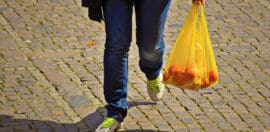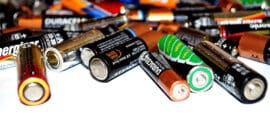Building a business on the foundations of radical transparency

Image supplied by Good Citizens Eyewear.
21 September 2022 at 8:59 pm
Focusing on sustainability and purpose is helping Good Citizens Eyewear turn single-use plastic bottles into a pair of sunnies.
Good Citizens Eyewear was created over a discussion about global single-use plastic waste at the family kitchen table. Co-founders Nik Robinson, his partner Jocelyne Simpson and sons Harry and Archie – who each have a 25 per cent stake in the company – felt inspired to play their part in cleaning up our planet.
Despite having no experience in design and manufacturing, the family worked together to find a way to turn a plastic bottle into a pair of sunglasses. It would take 752 days and 2,503 failed attempts to finally launch Good Citizens, but the brand’s ethicality and purpose quickly earned them worldwide acclaim.
“Starting up a business is hard. Starting up a business that does right by people and the planet is harder still,” says co-founder Nik Robinson.
“Our supply chains took 18 months to set up. It’s a challenge and it takes commitment, but we want to prove that you can make good money and fund good impact.”
Good Citizens is built on the value of ‘radical transparency’ – what you see is what you get – and it’s a philosophy reflected in the considered design, local production, honest marketing and green distribution of its environmentally-friendly products.
This value system is also woven through the guiding principles of Good Citizens, which include only using 100% recycled materials, making sustainable products that last, not exploiting people or the planet and allowing employees to spend time with their loved ones.
Despite the reputational risk that being so open undoubtedly brings, Robinson views Good Citizens’ approach as critical to its success and something that larger, more established businesses could learn from. He sees a responsibility for companies to show vulnerability and be receptive to social change, which will ultimately enable them to operate better in their communities.
“Good Citizens wouldn’t exist unless we had the social and environmental impact at our core. We’re here to solve a problem, not add to the problem,” explains Robinson.
“Those big corporations do one small thing, like make their boxes recyclable, and then PR the hell out of it, which is a real example of green-washing. It’s very frustrating when I see companies blatantly lying.
“It’s hard to admit that you’ve done something bad but business leaders should show some vulnerability because that’s what customers connect with. They need to make changes and keep making changes. It only takes a few small steps at a time,” he says.
One 600ml plastic bottle makes one pair of sunglasses – and the recycling process is fairly simple. Plastic bottles that end up in rubbish bins are sorted at a waste facility and bought in bulk. The lid and collar are removed and the bottles are washed, crushed, processed and melted into a workable material which is cut to make the frame and hinge of the glasses. This method means that Good Citizens’ products are 100% recycled, save for the lenses which are new.
The production is very fast – one pair of sunnies can be made in under one minute. There are no metal components or other materials mixed in, which creates minimal waste. And the modular design of the sunglasses also makes them repairable, further improving the brand’s sustainability impact and addressing the environmental toll of fast fashion.
“People fall into that same old rule of creating a product in a certain country, in a certain factory, and they turn a blind eye,” Robinson continues.
“Some businesses have not even considered sustainable practices because they’re so big. I know it’s hard to make a change, but they could make a massive impact globally.
“There are pressures now from consumers. Like we saw through the UN’s Sustainable Development Goals, people are realising that they have to be on to looking at ESG.”
To date, Good Citizens has recycled over 58,000 plastic bottles and removed just over 5,200 kilograms of plastic waste from the ocean through partnerships with organisations including the ReSea Project and Sea Shepherd. The company also offsets its carbon emissions by collaborating with C2Zero, and has so far stopped 45,000 kilograms of CO2 from reaching the atmosphere.
Education is just as important in the value system of Good Citizens, and the company has delivered presentations to organisations including Tesla and Google, and at the United Nations Global Impact Conference and the Global Retail Summit in Dubai – inspiring designers to work with recycled materials and effecting change at the highest levels.
“For brands like us, who are starting from nothing, sustainability is just common sense. Even if we can’t solve the whole problem, maybe we can play a small part,” concludes Robinson.
Pro Bono Australia is the media partner for the Social Good Summit, held in Melbourne on the 8th of October. Good Citizens Eyewear is a speaker.







